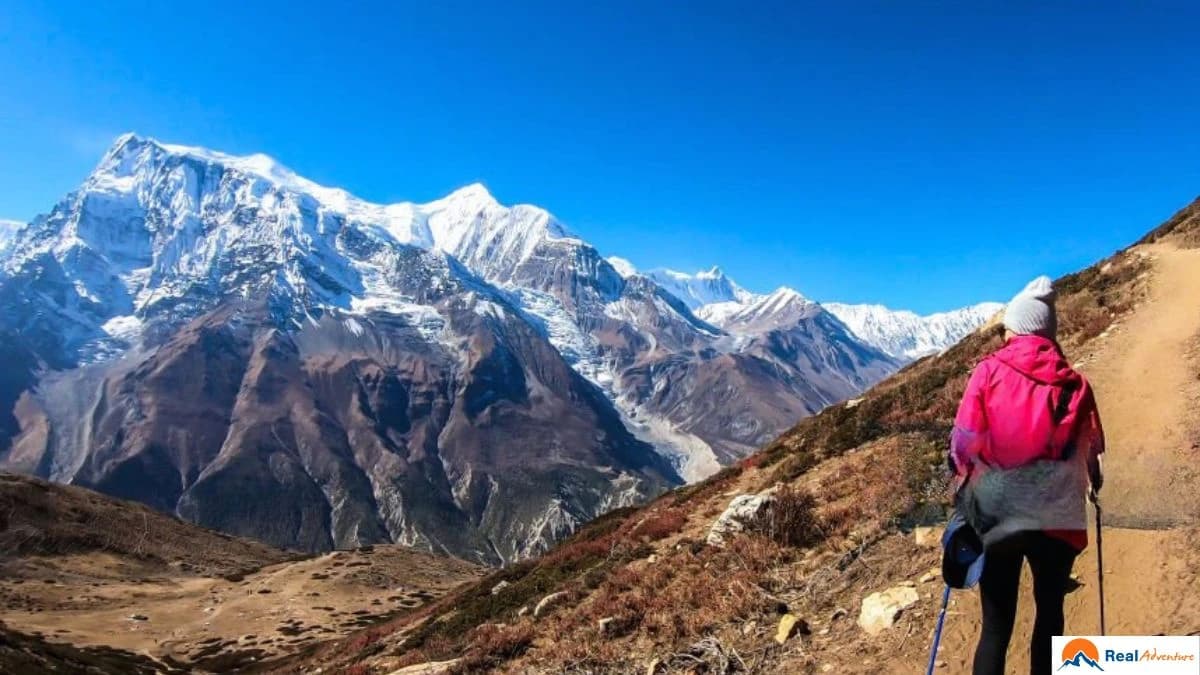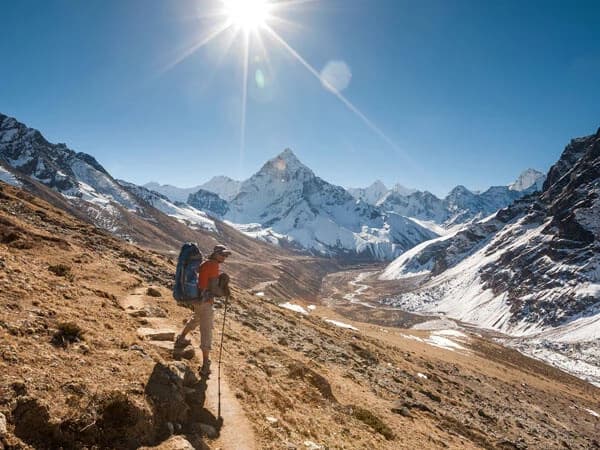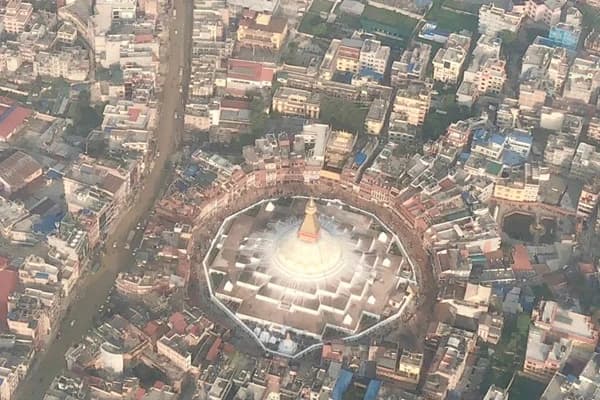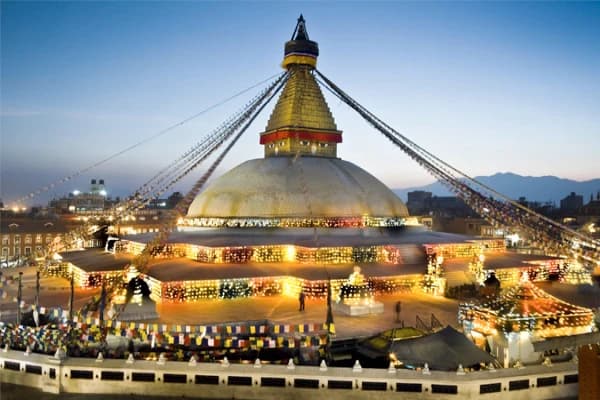Can You Trek to Everest Base Camp on Your Own? Many travelers are curious about this question. The answer is ‘Yes, you can,’ but only with proper planning and preparation. Trekking to Everest Base Camp alone comes with significant risks, especially when done solo. Potential dangers include altitude sickness, challenging navigation, and unexpected issues like injuries or equipment malfunctions. Our comprehensive guide provides the pros and cons of traveling solo to Everest Base Camp (EBC), helping you understand the risks involved.
Can You Trek to Everest Base Camp on Your Own?
Yes, you can trek to Everest Base Camp on your own, but it is risky and not recommended by the government of Nepal. Trekking solo poses different challenges and is only for some. It would help if you were physically and mentally prepared, with the right gear and a thorough understanding of the route and its difficulties. As of April 1, 2023, the government of Nepal requires you to hire a registered guide for the entire duration of your EBC trek.
A guide can assist with navigation, emergencies, and managing potential risks associated with high-altitude trekking. They also help ensure responsible trekking practices and minimize environmental impact.
What Are the Benefits of Trekking to Everest Base Camp on Your Own?
While trekking to Everest Base Camp (EBC) with a guide offers numerous advantages, a solo trek allows you to set your own pace, choose your rest stops, and tailor the experience to your preferences. It’s a unique opportunity to establish a deeper connection with nature and face the challenges of the trek independently. A solo trek can boost self-confidence and provide a profound sense of accomplishment.
Freedom and Flexibility in Itinerary Planning
A solo trek offers the freedom and flexibility to plan your trek based on your preferences. You can choose the pace, rest days, and detours that suit you best. No restrictions allow you to customize your itinerary or choose an alternative trekking route that aligns with your suitable and preferable time.
Opportunities for Personal Growth and Adventure
The solitude experienced during a solo EBC trek is more than an absence of sound. It’s a gateway to personal growth and adventure, offering opportunities for self-discovery, building resilience, and connecting deeply with nature. Engaging with locals directly, without a guide as an intermediary, can foster a deeper understanding of mountain life and living peacefully with nature.
What Are the Drawbacks if You Trek to Everest Base Camp on Your Own?
While the freedom and personal learning offered by a solo trek to Everest Base Camp (EBC) are enticing, it’s crucial to acknowledge the significant drawbacks and potential dangers involved. Solo trekkers face safety risks like altitude sickness, navigation difficulties, and possible emergencies, which are far more critical when you’re alone.
Before embarking on a solo Everest Base Camp trek, it’s essential to weigh these drawbacks carefully and ensure you possess the necessary skills, experience, and risk management strategies to navigate the challenges safely and responsibly.
Limited Support and Assistance
A solo trekker may need help with essential medical treatment or navigation if needed. A qualified guide can share valuable history, navigation, and primary medical care knowledge. As a solo trekker, ensure your travel insurance has adequate coverage for medical emergencies, evacuation, and trip cancellation.
Navigational Challenges
Getting lost or disoriented on unfamiliar and sometimes unmarked trails is a significant risk, especially in remote areas. Heavy snowfall or blizzards can reduce visibility, making navigation difficult and increasing the risk of getting lost. Solo trekkers, without the support of others, face a higher chance of falls and injuries. Investing in quality gear, downloading offline maps, or using regular apps showing the trail to your destination is essential.
Safety Concerns
Navigating high-altitude treks safely is crucial, and experienced guides significantly reduce the risk of altitude sickness. Recognizing symptoms and taking action is essential, especially for solo trekkers who face the additional challenge of managing their acclimatization schedule without expert guidance. Improper acclimatization substantially increases the risk of altitude sickness, highlighting the importance of having a qualified guide for a safe, enjoyable, high-altitude adventure.
What Essential Preparations Should You Make for Solo Everest Base Camp Trekking?
While solo trekking to Everest Base Camp (EBC) is challenging, understanding essential preparations can help when planning other treks or exploring alternative options for EBC itself.
Physical Fitness
Consider the physical demands of trekking in the Himalayas, including the altitude and steep terrain. Assess your endurance and fitness level to select a suitable journey. Mix your aerobic activities with swimming, cycling, and running to boost cardiovascular health. Focus on core exercises to build a stable foundation and strengthen your leg muscles with squats and lunges.
Mental Preparation
Thoroughly research the trek and understand the challenges, potential risks, and weather conditions. Mental preparation is key to feeling ready and confident for the journey ahead. Be prepared for mental and physical difficulties and maintain a positive and resilient attitude throughout the trek.
Documents and Permits
You'll need a trekking permit to explore these breathtaking landscapes, from verdant valleys to snow-covered peaks. This permit aids in environmental protection, ensures your safety on the trails, and supports the local communities you encounter. Purchase comprehensive travel insurance that covers medical emergencies, evacuation, trip cancellation, and loss of belongings.
Gear and Equipment
Pack appropriate clothing for various weather conditions, including layers for warmth, waterproof gear, and sun protection. Invest in good quality, well-fitting hiking boots with proper ankle support. Carry essential gear like a backpack, first-aid kit, headlamp, water purification tablets, trekking poles, and a map and compass (or GPS device with local maps downloaded).
Recommended Read :
Everest Base Camp Packing List
Safety Tips for a Solo Trek to Everest Base Camp
A solo trek to Everest Base Camp is risky. You will need a special permit to do so. You can obtain this permit through a trekking agency or the Nepal Tourism Board. Remember to purchase travel insurance covering medical evacuation in an emergency. Solo trekking requires additional planning and preparation. A crucial tip is to be self-sufficient and capable of making decisions.
Use the Proper Tools
Acquire advanced first-aid training and knowledge relevant to high-altitude emergencies. Invest in high-quality gear for high-altitude trekking, including clothing, footwear, navigation tools, and emergency communication devices. Be highly vigilant about potential symptoms of altitude sickness and take immediate action if necessary. Start early, trek slowly, and take frequent rest breaks for proper acclimatization. Drink copious amounts of fluids even if you don’t feel thirsty. Carry appropriate gear and clothing for various weather conditions, and be ready to adapt your plans if needed.
Can I Climb Mount Everest Base Camp with No Experience?
To reach base camp, trekkers don’t need technical climbing skills, equipment, or expertise, but the following points will ease the trek.
Physical Fitness
Although climbing isn’t involved, the trek is still physically demanding. You’ll walk for several hours daily on uneven terrain, sometimes at high altitudes. A moderate level of physical fitness is required to complete the trek comfortably. It is highly recommended that you engage in training specific to hiking and altitude beforehand.
Guide and Porters
Hiring a guide is not mandatory but can be particularly beneficial for beginners. A porter can lighten your load, allowing you to focus on enjoying the trek. A guide enhances your experience by providing insights into the local culture, history, and natural environment. They assist with navigating the trails, especially in challenging weather, help plan your itinerary, ensure proper acclimatization to avoid altitude sickness, and are trained to handle emergencies.
Final Thoughts
While it is technically possible to trek to Everest Base Camp on your own, it is strongly recommended that you don’t attempt it alone. The risks involved, including altitude sickness, difficult navigation, and erratic weather, make the knowledge and assistance of a trained guide essential. Going on a guided trek is highly recommended for anyone looking for a safe and pleasurable experience, especially for first-timers. In addition to ensuring proper acclimatization and offering support in an emergency, guides impart priceless expertise. Their knowledge of the area and culture can also greatly enhance your experience. Remember, prioritizing safety allows you to embrace the awe-inspiring beauty of the Himalayas fully. Plan your trip with Real Adventure Nepal Pvt. Ltd. to ensure a memorable, safe, and remarkable adventure.
FAQs
Can you trek to Everest Base Camp without a guide?
While technically possible in the past, trekking to Everest Base Camp without a guide is currently not allowed in Nepal. As of April 1, 2023, the Nepalese government implemented a regulation requiring all trekkers, including solo travelers, to have a licensed guide accompany them on the Everest Base Camp trek. This decision was made due to the significant risks associated with high altitude.
Can a beginner trek Everest Base Camp?
Everest Base Camp is possible for beginners but is challenging. It requires good fitness, proper acclimatization, and potentially a guide. Expect long hikes, high altitude, and potential altitude sickness. Train well, plan your trip, and listen to your body for a safe and rewarding adventure.
Is Everest Base Camp Trek safe for solo female travelers?
Everest Base Camp is generally considered safe for solo female travelers compared to other trekking destinations in Nepal or worldwide. Nepal boasts a relatively low crime rate, and the Everest Base Camp region maintains explicitly a strong sense of community and respect for tourists.
When is the best time for a solo trek?
The best times for an Everest Base Camp trek are from March to May or mid-September to November.







-(5).webp&w=1200&q=75&dpl=dpl_CtNAyRzUAwPdWKDCFxYk5p2VryPh)